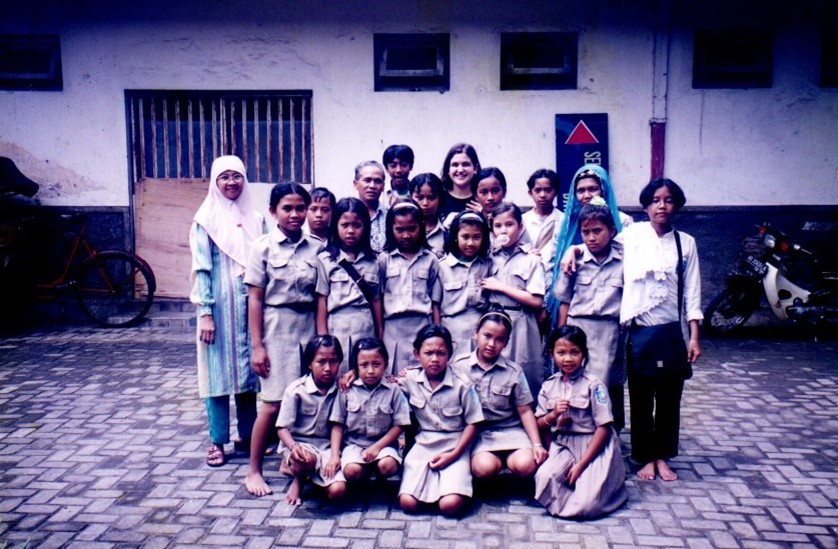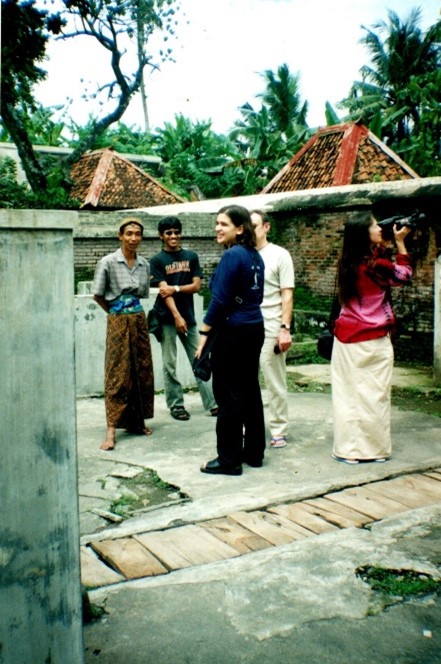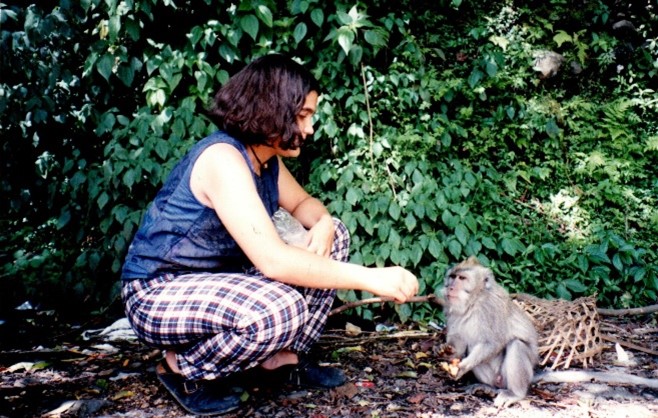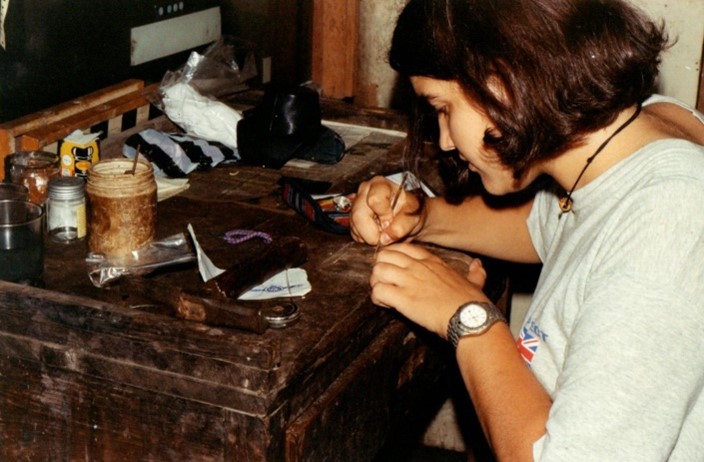Blog Article: Q&A with Kate Watson, Indonesia 1995/96
Kate Watson, a Returned Volunteer from Indonesia 1995/96, and current Chief of Communications at UNICEF Pacific, talks with us about the impact her Project Trust placement had on her life and career choices. While reflecting on her year with Project Trust, Kate also outlines how her time living and working in South East Asia has influenced her approach to climate change and the environment.

1. Could you tell us a bit about your Project Trust experience? Where and when did you go, and how has that experience shaped your life since?
I joined Project Trust in 1995 and embarked on my journey to Yogyakarta in Indonesia to teach adults English. Before I went to Indonesia, I didn’t even know where it was, let alone anything about it, but since then, I’ve spent at least 12 years in Indonesia, and a few more in the rest of South East Asia.
I’d applied to Project Trust because I didn’t want to go straight to university. I was a bit sick of being in a formal learning environment, but I didn’t want to do nothing – I wanted to explore. I remember this bizarre realisation on the plane journey, that for the next twelve months, every single person I met would be someone new, someone I hadn’t known before I turned 18. This was before internet and mobile phones, so I wouldn’t be able to even email, let alone WhatsApp, with anyone I’d known before I turned 18. It’s incredible to think about that now when Indonesia is really pushing ahead of the rest of the world in digital media.

That year was so long, in a fantastic way – everything we saw or did was new, and strange, and friendly, inviting, and exciting. Even the scents and sounds were enticing and still make me very nostalgic. My fellow Volunteers and I were placed with lovely families, who took us under their wings and involved us in their lives. In my host family, the brother was a student photographer and I was trying to learn- we would go off on his motorbike to see tiny temples in the middle of rice fields, or Buddhist festivals at sunrise, or we’d potter around the batik-making village, chatting with his friends amid the smell of the hot wax and big vats of fabric dyes.
The grandfather was a silversmith so every Sunday we’d crowd into his little workshop, lit by oil lamps, and learn to make silver jewellery. He was also a musician in a Keroncong band – a unique mix of Portuguese and Javanese, so we joined in, learned a song, and dressed up to perform live on the local radio.

Wherever you walked in the evening in Yogya, at least in those days, you’d hear the sounds of gamelan music – a rhythmic, tuned percussive sound, with Javanese singing and violin over the top, and with clove cigarette smoke wafting through the air, so we were very happy to join a local gamelan orchestra. And by day of course we taught. I’m not sure I’m a great teacher, but I did enjoy my experience. I spent my time developing lesson plans for each day and figuring out how to get points across- in an interesting way- for a daunting audience of people older than me, speaking a different primary language. I think that has been instrumental in supporting the work I now do in communications!
There was so much to see, learn and experience – it gave me such a huge thirst for travelling and meeting new people. I can happily say that my year with Project Trust set me off on my career. Writing a diary while I was there, photographed what I could, and detailed everything new. I loved my experience so much that that it led me to apply for South East Asian Studies with Indonesian Language at Hull University. Through my course, I’d have a funded year back in Yogyakarta.
2. And what are you up to now? Can you tell us more about your current role?
Post university, and after a few years managing Arts in Education Organisations, I set off on my travels to “seek my fortune” (which to me means happiness and contentment in whatever form that comes) with a blog, consulting for NGOs on my way. That led me into UNICEF, the children’s rights arm of the UN. Through UNICEF, I’ve worked in Indonesia, Yemen, Jordan, Laos and now I cover 14 countries in the Pacific as the Chief of Communications. I’m based in Fiji, which is typically known for beautiful beaches and sunshine, but there’s also a lot of challenges for children, and that’s why we’re here.
UNICEF works to improve the rights of every child, globally. That means we support governments to improve healthcare, nutrition, water, sanitation and hygiene, education, child protection and many more areas. The 14 countries we cover in the Pacific are vastly different from each other, but many face issues such as droughts, sanitation, and nutrition (often due to a lack of diet diversity).

My team helps to raise awareness of our work among the public through digital media. We write and produce media content, stories, photos and videos, and support celebrity and donor visits- all of which are designed to advocate and drive support to improve children’s lives. One important element is that we strive to find ways to involve children and young people in what we do, providing platforms for them to reach more (or specific) audiences with their own messages and participation.
3. What advice do you have for our younger members of the Project Trust Community who are looking to build their skill set and careers?
Go into everything with a spirit of learning. Offer your skills and your time but find opportunities and grab them – don’t wait for things to come to you. Every experience you have teaches you something; there’s so many opportunities out there to increase your own knowledge and experience. Talk to all sorts of people, with all sorts of perspectives – every once in a while, one of those people knows someone who knows someone else, and that’s your path! I built my entire career on those connections, as well as a willingness to try new things and to put up with a bit of discomfort.
As a white person, if you approach everything as a learning opportunity, you’re also more likely to avoid the white saviour complex, which I sincerely hope you aim to do. If you go looking for similarities and learning, you’re going to find a lot of friends, comfort, and support wherever you go. But if you get sucked into the belief that you already know everything, or that the people you’ve come to help would have been lost without you, then you will lose the opportunity to really grow (and you’ll annoy a lot of people in the process!).
My advice for Project Trust Volunteers heading out on their year abroad is to write a diary. Live in the moment, look, smell, observe, chat, ask questions and write down all those interesting things that happen to you. I wrote so much during my Project Trust year, and I would have forgotten a lot of the unique moments had I not kept my diary.
4. On the theme of Earth Day, how has your time living and working in SEA impacted your views on climate change and the need to protect the environment?
I have lived and worked in a lot of places that have a bad deal when it comes to climate change and protecting the environment. It seems, more often than not, that those least responsible for the climate crisis are those most likely to suffer the consequences – that’s certainly the case for children throughout the whole world, whose future is already impacted by our present. But it’s also true of what we do to each other – recycled waste ends up in countries without recycling facilities, plastics wash up on the white sand beaches of far-off lands, factories and traffic pollute the air breathed by pedestrians.
Several of the countries in the Pacific are under threat of disappearing in the next few years as their shores disappear with rising tides. It all seems very unfair, but it is up to every one of us to make a difference. Yet sustainable choices are rarely the cost-effective option, and that makes it very hard on an individual level. We must collectively do what we can though to reverse the damage already done, or there won’t be any environment left to protect.
For World Water Day, March 22nd, 2023, we produced a video about how children from Pacific Island countries least responsible for climate change, are already paying the highest price.
Watch here World Water Day | UNICEF
